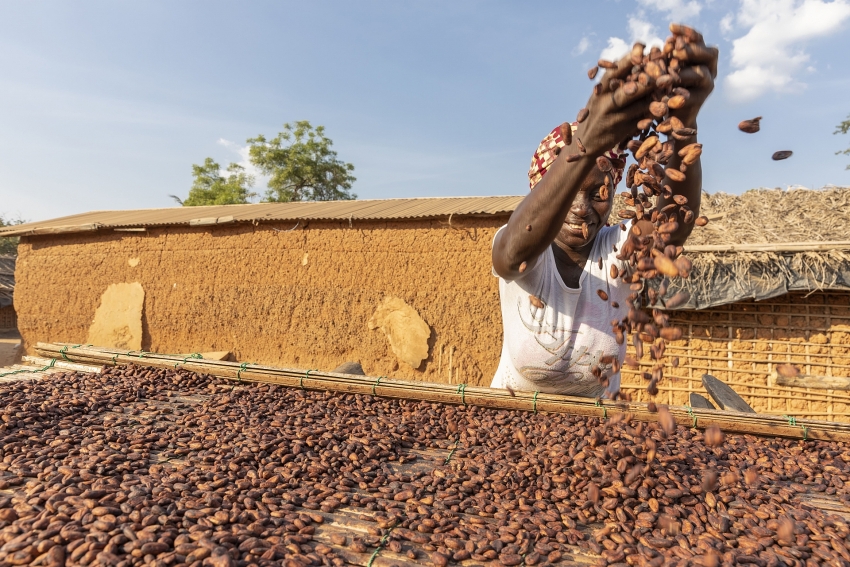Cargill demonstrates significant progress against critical sustainability goals
Sustainability is written into the purpose of Cargill – and woven into core operations including investment priorities, organisational structure, and resource allocation. The company recently outlined progress against sustainability goals in critical supply chains including aqua nutrition, cocoa and chocolate, palm, soy, ocean transportation, and beef. With a focus on advancing progress on land use, climate change, water, farmer prosperity, and human rights, the company is working across every supply chain to drive sustainable production, transportation, and operations.
 |
| Cargill is making efforts to achieve further sustainability via improving farmers’ livelihood |
“The call for radical transparency is increasing. More than ever, our customers and consumers want to understand the story behind the products they buy,” said Jill Kolling, vice president of Global Sustainability of Cargill. “By investing and partnering on solutions to enhance transparency in the food system, we can deliver meaningful and sustainable impact on the ground and increase consumer confidence.”
Over the past year, Cargill adopted global sustainability efforts to more quickly advance progress. The company established a science-based commitment to reduce supply chain emissions by 30 per cent by 2030, a bold climate commitment to reinforce support of the Paris Climate Commitment. Cargill established its Forest Protection Advisory Panel to bring diverse insights and support continuous improvement on the ground. Additionally, Cargill’s BeefUp Sustainability Advisory Panel will offer critical review of the strategy and resources underpinning the North America beef supply chain sustainability initiative.
Regarding aqua nutrition, Cargill supports the sustainable growth of the global aquaculture industry by enabling better seafood and helping farmers succeed. With a focus on delivering animal health and welfare through feed and nutrition, Cargill reports in accordance with Global Reporting Initiative Standards, which provides a level of transparency to build trust.
In terms of cocoa and chocolate, Cargill is committed to a transparent and sustainable supply of cocoa, which includes improving the lives of farmers and their communities in the five origin countries from where it directly sources cocoa – Brazil, Cameroon, Côte d’Ivoire, Ghana, and Indonesia. Cargill’s Cocoa & Chocolate 2018-2019 sustainability progress report is more data-driven to transparently share insights into sustainability progress.
As for occean transportation, Cargill is bringing increased transparency to the maritime sector and has been one of the first to publish an annual corporate responsibility report since 2017. The company has been transparent about its learning process along the way, which includes recognising the need for a standard greenhouse gas emissions reporting process that will become the industry norm.
With palm oil, Cargill is on track to deliver its 2020 commitments, making significant progress in sustainable palm oil since introducing the Policy on Sustainable Palm Oil in 2014. These commitments include:
- Cargill is on track to eliminate deforestation in all commercial palm concessions in our third-party supply chain by the end of 2020.
- Cargill has achieved 93 per cent traceability to mills and 48 per cent to plantations. The company continues to work towards its goal of providing traceability to plantations by the end of 2020 in high-risk landscapes, implementing a targeted, risk-calibrated approach.
What the stars mean:
★ Poor ★ ★ Promising ★★★ Good ★★★★ Very good ★★★★★ Exceptional
Related Contents
Latest News
More News
- Trung Nam-Sideros River consortium wins bid for LNG venture (January 30, 2026 | 11:16)
- Vietnam moves towards market-based fuel management with E10 rollout (January 30, 2026 | 11:10)
- Envision Energy, REE Group partner on 128MW wind projects (January 30, 2026 | 10:58)
- Vingroup consults on carbon credits for electric vehicle charging network (January 28, 2026 | 11:04)
- Bac Ai Pumped Storage Hydropower Plant to enter peak construction phase (January 27, 2026 | 08:00)
- ASEAN could scale up sustainable aviation fuel by 2050 (January 24, 2026 | 10:19)
- 64,000 hectares of sea allocated for offshore wind surveys (January 22, 2026 | 20:23)
- EVN secures financing for Quang Trach II LNG power plant (January 17, 2026 | 15:55)
- PC1 teams up with DENZAI on regional wind projects (January 16, 2026 | 21:18)
- Innovation and ESG practices drive green transition in the digital era (January 16, 2026 | 16:51)

 Tag:
Tag:























 Mobile Version
Mobile Version